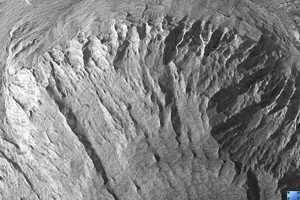
Click on image for larger versionThis HiRISE image (PSP_002630_1695) shows an outcrop of bright material in Melas Chasma, part of the giant Valles Marineris trough system.
These troughs contain many bright deposits, often layered. The origin of these materials is still not known, but is the subject of much study because answering this question will provide important information regarding the geologic history of Mars.
In this image, some layers can be seen, but much of the surface has a strange scalloped texture. The cause of this texture is unclear, but it is likely related to the mechanism of erosion of these deposits as well as their physical nature.
These materials are being eroded by winds, forming elongated ridges called yardangs. These winds may also be responsible for the small-scale scalloped texture. Also, landslides have produced some talus cones, composed of piles of loose debris; these are visible in places, mostly near the base of the mound, as wedge-shaped features containing many boulders.
Observation Toolbox
Acquisition date: 2 February 2007
Local Mars time: 3:41 PM
Degrees latitude (centered): -10.3°
Degrees longitude (East): 268.2°
Range to target site: 264.7 km (165.4 miles)
Original image scale range: 26.5 cm/pixel (with 1 x 1 binning) so objects ~79 cm across are resolved
Map-projected scale: 25 cm/pixel and north is up
Map-projection: EQUIRECTANGULAR
Emission angle: 8.5°
Phase angle: 64.0°
Solar incidence angle: 56°, with the Sun about 34° above the horizon
Solar longitude: 185.5°, Northern Autumn
NASA's Jet Propulsion Laboratory, a division of the California Institute of Technology in Pasadena, manages the Mars Reconnaissance Orbiter for NASA's Science Mission Directorate, Washington. Lockheed Martin Space Systems, Denver, is the prime contractor for the project and built the spacecraft. The High Resolution Imaging Science Experiment is operated by the University of Arizona, Tucson, and the instrument was built by Ball Aerospace and Technology Corp., Boulder, Colo.

 Planetary Data System
Planetary Data System













